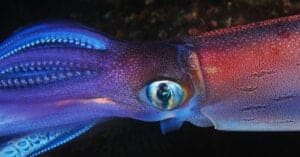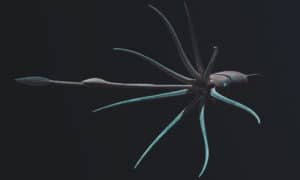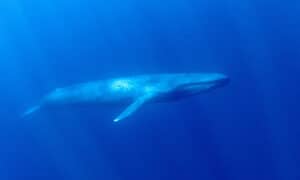When you talk about squid, you might immediately think of only one kind, swimming around oceans. But in reality, there are over 300 species of squid that are found both on coastal and oceanic waters. A squid, like the cuttlefish, has four pairs of arms and a pair of tentacles on each side. At first glance, you’ll easily think that squid only eat plants because of their not-so-visible mouths, but the truth is they are almost exclusively carnivores. Squids have an insatiable appetite, and even a small squid can consume a substantial amount of food. Squid may be carnivorous, but what they eat varies depending on their size and species. Let’s dive into the full details on what squid eat!
What Do Squid Eat?
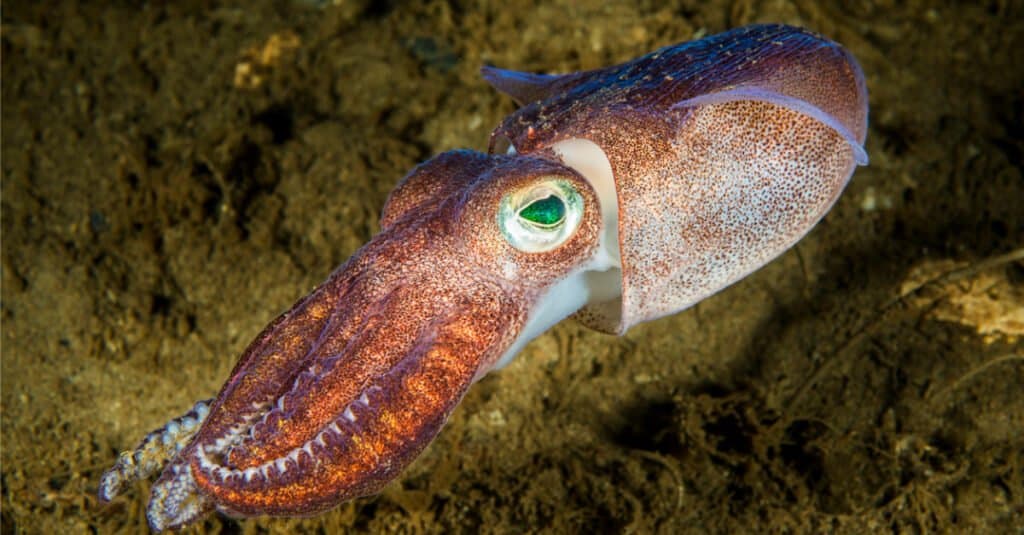
Squid eat fish, crabs, other species of squids, and occasional small plants
©iStock.com/RLSPHOTO
Squid are predators that eat fish, crustaceans, and cephalopods like other squid! Young squids may incorporate some plant matter in their diet to compliment their predatory catches. In their early years squid will eat:
- Small Plants
- Plankton
- Algae
- Krill
- Clams
- Crustaceans
- Crabs
- Shrimps
- Orange roughy
- Hokie
- Oysters
- Lantern fish
- Smaller squid
With more than 300 species of squid their diet can vary dramatically. Crustaceans such as shrimp and some species of fish are primary sources of nutrition for squid. For the bigger species of squid, they often prey on larger fish such as sharks, among other prey. Adult squid of medium size usually eat the following:
In 1994 a team of scientists studied the stomach contents of a squid named the long-finned squid to examine what they eat in more detail. They found that 73% of stomach with food contained fish, 26.4% contained crustaceans, and 7.5% contained cephalopods (octopus, nautilus, other squids, etc.). The most popular fish for this squid species which lives in the North Sea were cod, sprat, and goby.
What Do Giant Squid Eat?
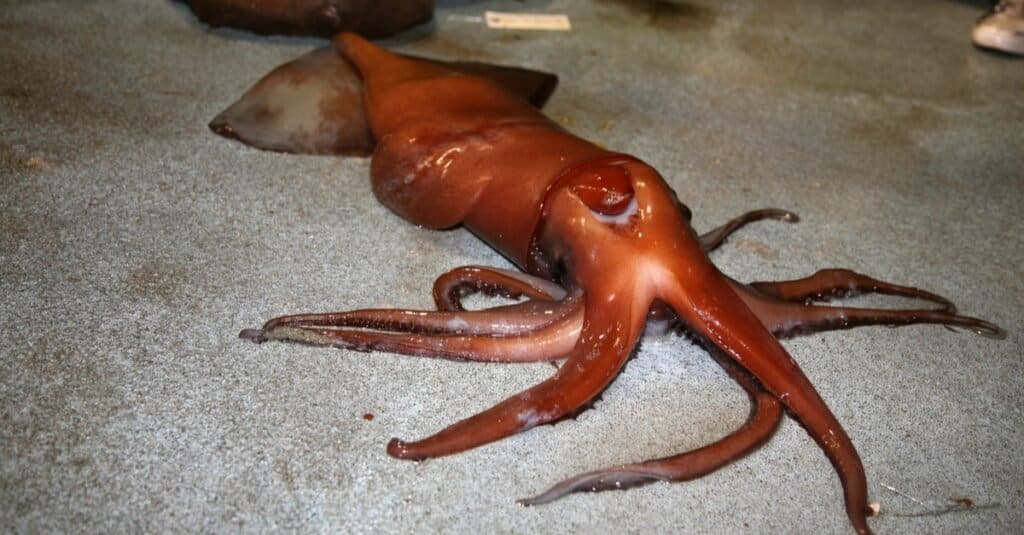
Adult giant squid eat anything from whales to deep-sea fish. Young sharks and other large sea animals are not exempted.
©mikeledray/Shutterstock.com
Adult giant squid are solitary hunters and they eat almost anything that comes their way. Scientists have opened the stomachs of giant squids washed up on beaches to see what they ate, even though they haven’t witnessed them feeding in action. Giant squid frequently prey on large sea creatures such as deep-sea fish, young sharks, and other large sea animals. They can even prey on other squid as well. Certain species of giant squid are known to be so aggressive that they have been known to attack sharks in order to obtain food.
Here are the foods that compose what giant squid eat in their diet:
- Deep-water fish
- Sharks
- Schools of small fishes
- Other squid
Because of its enormous size, the giant squid is one of the most aggressive hunters on the planet. As a result, it is free to eat whatever it wants. Giant squid often mistakenly believe that ships are large prey, resulting in numerous reports of giant squid attacking ships.
How Do Squid Hunt and Eat their Prey?
Small squid usually hunt in groups. Squid have soft bodies and no vertebrae, making them ideal for swimming and hunting in water. They have a large head as well as two large eyes. Every squid has three hearts and a slender digestive tract that connects through its brain. Each squid also has eight arms or tentacles which possess circular disc-like structures called suckers, that aid in the squid’s ability to snap at its prey in order to gain grip.
The squid’s beak is sharp and parrot-like, and is located near its mouth. It uses this technique to shred the prey before devouring it. It also has a tongue-like structure with teeth that are similar to file teeth. They perform like grinders, reducing the food to tiny little pieces before it is ingested. Due to the fact that the squid’s esophagus passes through its brain, food must be finely chewed before it can be absorbed into the system.
How Much Do Squid Eat?
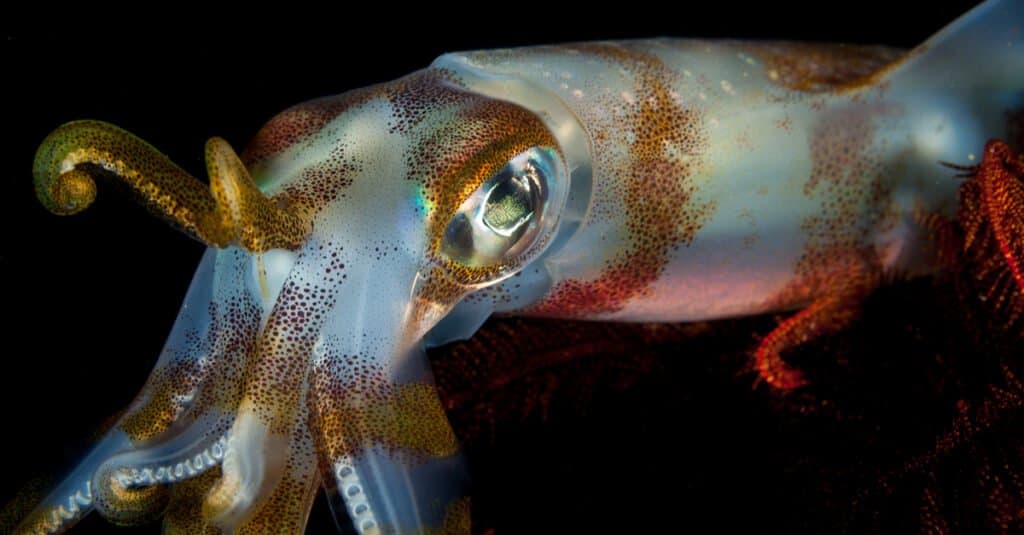
Squid can consume 30 percent of their body weight in a day.
©Gerald Robert Fischer/Shutterstock.com
Squid may be carnivorous, but their diet depends on their size. Squids vary in size, ranging from just a few inches to more than 30 feet in length. The smaller the squid is, the lower it sits in the food chain.
On average, squid can consume 30 percent or more of their body weight in a single day, according to some estimates. During the first half of their life cycle, they have the potential to increase their biomass by 10 to 15 percent per day. With age, this percentage drops to around 5 percent as they reach maturity.
Which Predators Eat Squid?
Even though small squid are predators, they are also prey for a wide range of other animals, including birds and fish as well as sharks, whales, even to humans and other large-sized squid.
Squid are known to be good swimmers, helping them escape predators fast. Squids have chromatophores on their skin, which are pigmented cells arranged in layers that allow them to change their color to match their surroundings as needed. Their agility and ability to change colors not only aid them in evading predators, but also make it easier for them to pounce on prey when they are caught.
A large number of vertebrate predators are reliant on squid. Squid is the primary source of nutrition for animals such as the grey-headed albatross and the sperm whale, according to studies. Sperm whales’ stomachs have been found to contain giant squid beaks and other undigested pieces of giant squid, which scientists believe to be the remains of a particularly large serving of calamari. Sucker marks have been discovered on the skin of beach-stranded sperm whales, as well as battle scars that are so large that only a giant squid could have caused them, according to researchers. Scientists have also discovered that squid are a primary food that hammerhead sharks eat.
The photo featured at the top of this post is © Rui Palma/Shutterstock.com
Thank you for reading! Have some feedback for us? Contact the AZ Animals editorial team.



